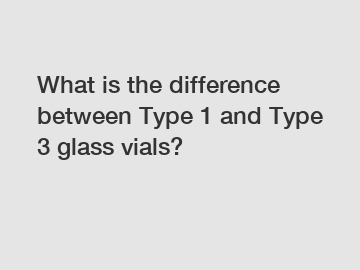What is the difference between Type 1 and Type 3 glass vials?
What is the difference between Type 1 and Type 3 glass vials?
Type 1 and Type 3 glass vials are both commonly used in various industries, including pharmaceuticals, biotechnology, and laboratory research. However, there are distinct differences between these two types of glass vials in terms of composition, properties, and recommended applications. Understanding these differences is crucial for ensuring the safe storage and transportation of sensitive substances. So, let's delve deeper and explore the dissimilarities between Type 1 and Type 3 glass vials.
1. Composition:

Type 1 glass vials, also known as borosilicate glass, are made with a high percentage of silica and boron oxide. This composition enables the glass to have excellent thermal resistance, chemical durability, and low expansion rate. Type 1 glass vials are highly resistant to alkali and acidic substances, making them ideal for storing and transporting sensitive medications, vaccines, and biological samples.
On the other hand, Type 3 glass vials, commonly referred to as soda-lime glass, are manufactured with a lower-quality composition compared to Type 1. They are primarily composed of silica, soda, and lime. While Type 3 glass vials are cost-effective and widely available, they lack the superior properties offered by Type 1 glass. Therefore, they are generally used for non-sensitive applications such as storing non-reactive substances or packaging solid chemicals.
2. Resistance to Thermal Shock:
One of the significant advantages of Type 1 glass vials is their exceptional resistance to thermal shock. This means that they can withstand rapid temperature changes without cracking or breaking. This property makes Type 1 glass vials suitable for processes involving extreme temperatures, such as lyophilization and autoclaving. In contrast, Type 3 glass vials have a lower resistance to thermal shock, and therefore, should not be subjected to sudden temperature fluctuations.
3. Chemical Durability:
Type 1 glass vials are highly chemically durable due to their borosilicate composition. They can resist attack from a wide range of corrosive substances, including strong acids and bases. This makes them particularly valuable for drug products that may interact with the container. On the other hand, Type 3 glass vials have lower chemical durability and are not recommended for substances that are reactive or corrosive.
4. Packaging and Shelf Life:
The choice between Type 1 and Type 3 glass vials can significantly impact the shelf life of a product. Type 1 glass vials offer better protection against leaching, which is the potential release of glass-related compounds into the product. As a result, they are favored for high-value pharmaceuticals, where maintaining product integrity and stability are critical. Type 3 glass vials, while widely used for non-sensitive applications, may not provide the same level of protection against leaching, affecting the product's shelf life.
In conclusion, the difference between Type 1 and Type 3 glass vials lies in their composition, properties, and recommended applications. Type 1 glass vials, made from borosilicate glass, exhibit superior thermal resistance, exceptional chemical durability, and resistance to thermal shock. They are commonly used for storing and transporting sensitive medications and biological samples. On the other hand, Type 3 glass vials, composed of soda-lime glass, are less chemically durable, have lower resistance to thermal shock, and are mainly employed for non-sensitive applications. Choosing the appropriate glass vial type is crucial to ensure the safety and integrity of the stored substances, as well as to maximize the product's shelf life.
Contact us to discuss your requirements of vials manufacturer for injection, neutral borosilicate glass tube manufacturer, pharmaceutical glass types. Our experienced sales team can help you identify the options that best suit your needs.

Comments
0